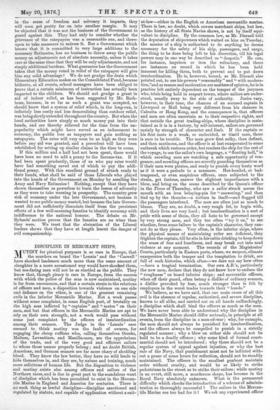DISCIPLINE IN MERCHANT SHIPS. TUTLNY for piratical purposes is so
rare in Europe, that the murders on board the 'Lennie' and the ' Caswell ' have shocked landsmen much more than the same amount of slaughter in a more accustomed way would have shocked them, but sea-faring men will not be as startled as the public. They _know that, though piracy is rare in Europe, from the success with which the police of the seas is now maintained, mutiny is far from uncommon, and that a certain strain in the relations of officers and men a disposition towards violence on one side and defiance on the other, is one of the greatest remaining evils in the inferior Mercantile Marine. Not a week passes without some complaint, in some English port, of brutality on the high seas inflicted by " captains " and " mates " on their men, and but that officers in the Mercantile Marine are apt to rely on their own strength, not a week would pass without some just complaint by the officers of insubordination among their seamen. The Judge in the ' Lennie ' case seemed to think mutiny was the fault of owners, for engaging the cheap ruffians who, calling themselves Greeks, Maltese, Levantines, and Manilla-men, are the opprobrium t3 f the trade, and of the very good and efficient sailors to whom those names properly belong ; and no doubt British, American, and German seamen are far more chary of shedding blood. They know the law better, they have no wild lands to hide themselves in, and they are, by nature and training, much more solicitous of human life. But the disposition to violence and mutiny exists also among officers and sailors of the Northern races, and is due in great part to the scandalous want of discipline which has been permitted to exist in the Mercan- tile Marine in England and America for centuries. There is no such thing as lawful discipline—discipline sanctioned and regulated by statute, and capable of application without a suit- at-law--either in the English or American mercantile marine. There is law, no doubt, which covers merchant ships, but law, as the history of all State Navies shows, is not by itself equi- valent to discipline. By the common law, as Mr. Disraeli told the deputation of shipowners which waited on him on Tuesday, the master of a ship is authorised to do anything he deems necessary for the safety of his ship, passengers, and cargo, the thing to be done being left to his discretion, till his legal powers may in one way be described as "despotic." He can, for instance, imprison or iron the refractory, and there are instances on record in which he has been held innocent for killing them, both to prevent and to put down insubordination. He is, however, bound, as Mr. Disraeli also pointed out, to use his powers " reasonably " and " with modem- tion,"and as reason and moderation are matters of opinion, he is in practice left entirely dependent on the temper of the jurymen who, trials being held in seaport towns, where sailors are under- stood, usually sway to the side of authority. Juries vary, however, in their tone, the chances of an accused captain in Liverpool or Hull being very different from his chances in Calcutta or Hong Kong, and the consequence is, that officers and men are often uncertain as to their respective rights, and that outside the great trading-ships, where discipline is main- tained as it is in a factory, by self-interest, sailors are governed mainly by strength of character and limb. If the captain or his first mate is a weak, or undecided, or timid man, there is sure to be trouble. The men grow first sulky, then defiant, and then mutinous, and the officer is at last exasperated to some outbreak which restores order, but renders the ship for the rest of the voyage, to use the sailor's own language, a "floating hell," in which scowling men are watching a safe opportunity of ven- geance, and scowling officers are secretly guarding themselves aa if their men were pirates, and ready to punish every hasty word as if it were a prelude to a massacre. Hot-headed, or bad- tempered, or even suspicious officers, once subjected to the strain, get furious, answer the slightest impertinence with a blow, and bring on the scene described by the Queen's officer in the Times of Thursday, who saw a sailor struck across the mouth with an iron belaying-pin for "answering," and then tied up by the thumbs—a torture in itself—and flogged till the passengers interfered. The men are often just as much to blame. They are, no doubt, a very rough lot, to begin with, and their lives are very hard ; but insubordination is a sort of pride with some of them, they all hate to be governed except by very strong men, and they too often "try it on," to see whether, from some failure in the captain's character, they can- not do as they please. Very often, in the inferior ships, where the physical means of maintaining order are deficient, they frighten the captain, till he sits in his cabin drinking to keep down the sense of fear and loneliness, and may break out into mad violence at any moment. The records of the Magistrates' Courts, particularly in Eastern ports, where, we suspect, climate exasperates both the temper and the temptation to drink, are full of such histories, which often—we dare not say how often —have a tragical termination. Our own A.B.'s, particularly the new men, declare that they do not know how to endure the " roughness " on board inferior ships ; and mercantile officers, when off their guard, often betray a dislike of ordinary seamen, a dislike provoked by fear, much stronger than is felt by employers in the worst trades towards their "hands."
We believe, as we have said, that one main cause of all this evil is the absence of regular, authorised, and severe discipline, known to all alike, and carried out on all hands unflinchingly, a discipline which shall bind the officers as much as the men. We have never been able to understand why the discipline in the Mercantile Marine should differ seriously, in principle at all events, from the discipline in a man-of-war ; why, for example, the men should not always be punished for insubordination, and the officers always be compelled to punish in a strictly regulated manner ; why a blow on either side should not be held to be a deadly offence ; why some kind of formal court- martial should not be introduced ; why there should not be a regular system of appeal against injustice, or why the best rule of the Navy, that punishment must not be inflicted with- out a pause of some hours for reflection, should not be steadily maintained. The officers in the smallest gunboat maintain order without cruelty, and would be as likely to strike pedestrians in the street as to strike their sailors ; while mutiny in an overt, still more, a murderous shape, has become in the Royal Navy absolutely unknown. What is the permanent difficulty which checks the introduction of a scheme of adminis- tration so thoroughly successful ? The sailors in the Mercan- tile Marine are too bad for it ? We ask any experienced officer
if the Queen's sailors are much better—for the purposes of dis- cipline, we mean—except so far as that sound training, and a full reliance on obtaining at least legal justice, have made them better. The officers cannot be trusted with such powers ? The majority of them could, if they were held to account as rigorously for their use of them as the Queen's offi- cers are, and the remainder could be brought by strict care up to that standard. It is not their interest to be brutes, or to fight their sailors with their own hands, or, in fact, to do anything except secure quick and implicit obedience. The officers of the Mercantile Marine would not like it ? They have no claim to be more released from disci- pline than the Queen's officers are, while as to owners, if the regulations force them to take more trouble in selecting officers and men, or to spend a little in securing two or three men on each ship who can be relied on, like marines, under all cir- cumstances, so much the better for the service. We do not, moreover, understand the owners to be opposed to such a code. Before Mr. Disraeli, their representatives asked, no doubt, for a great deal too much ; asked, for instance, that a master should be allowed not to record punishments in the log-book- a fatal mistake—but that was in view of a continuance of the present rough-and-ready system, not in view of a rigorous and coherent Code, controlling officers and men alike. At all events, they cannot in reason object to a discipline found to be sufficient on the Queen's ships, or de- clare that their officers, when armed with such powers, would "go about in terror." They fancy, of course, that unless they exaggerate their case, the community, fearing brutality, will refuse their officers the necessary powers, but there is no serious danger of that form of weakness. No one in the House of Commons doubts that on board ship orders must be swiftly obeyed, or believes that swift obedience is attainable without stringent discipline. The desire of the philanthropists is only that responsible discipline, however severe, should take the place of irresponsible violence. It is not a question whether a master ought or ought not to be au- thorised to lay a man in irons, but whether he ought to be allowed to do it without inquiry, without reflection, and with- out responsibility to superiors of his own profession. The captain of a man-of-war governs without being raised above the law, and we fail to see why the captain of a merchantman cannot so govern too ; or why, if vested with similar powers, he should object to be subjected to a similar responsibility. What, in fact, is the unanswerable objection to make the Mercantile Marine for disciplinary purposes a branch of the national Marine, officers and men alike being liable to a court-martial in any port containing officers enough to hold one.































 Previous page
Previous page